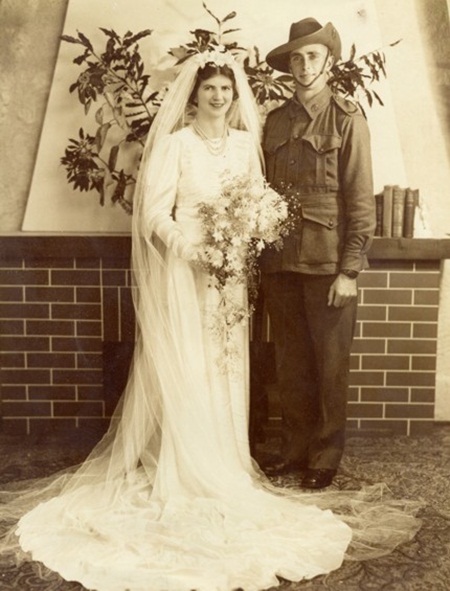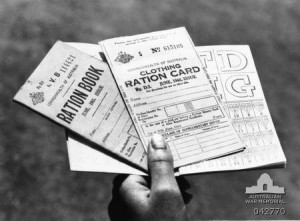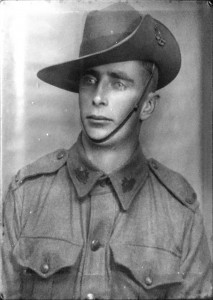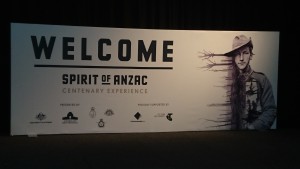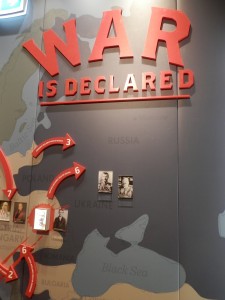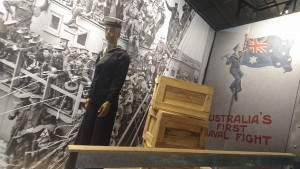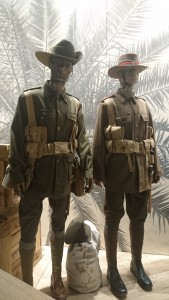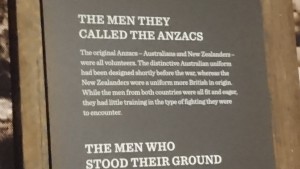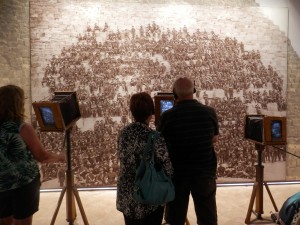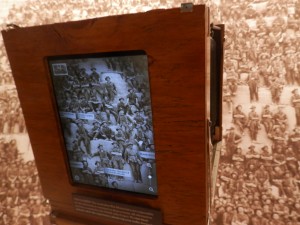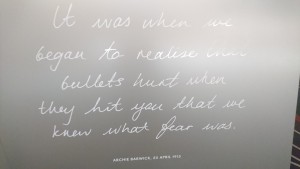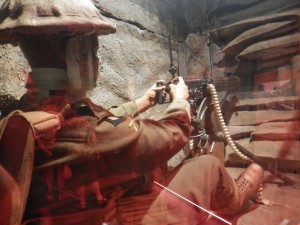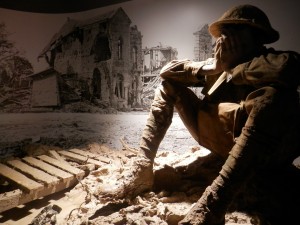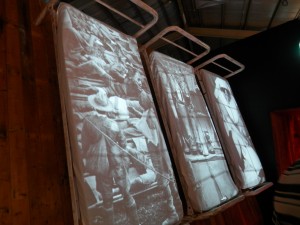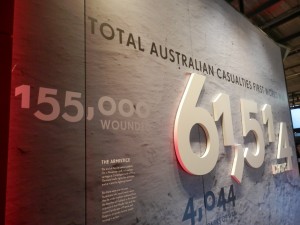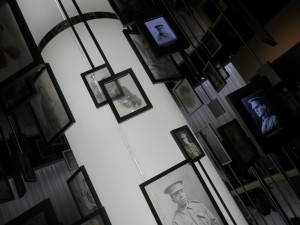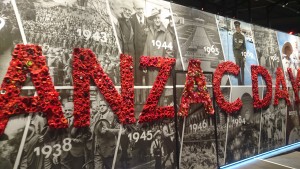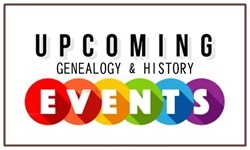Reminiscences of WW2 from My Grandparents – Part 2
ANZAC Day. A day that Australians and New Zealanders remember of those who went to war. A day to remember those who never made it home. And it is also a day to remember those who were left at home during the war and afterwards.
Last week I wrote “Reminiscences of WW2 from My Grandparents – Part 1” which is primarily an interview with my grandparents Evelyn and Cecil Hannaford about their experiences during World War 2.
This interview, which was done as a high school project a number of years ago by a friend who interviewed them, is written as a transcript. So this is my grandparents talking about their own experiences during the war, In. THEIR. OWN. WORDS! Not as history books records it, but as they experienced it.
As it was a long interview I decided to split it into two, and this is the continuation.
Continuation of the interview …
What type of weather was it?
Mr H. It was winter time. Then when we got up to Trincomalee [Sri Lanka] it was summer time, in the tropics. We were out in the bay and the sister ship, Mary, went out into the harbour and they had all the port holes open, light shining everywhere. We had to have ours shut and it was hot.
Did you have enough food?
Mrs H. Well, everyone was rationed.
What were the ration books like?
Mrs H. We were given ration books and you had to have so many coupons for tea and sugar and butter. We weren’t troubled about the butter because we made our own.
Mrs H. We had to go to the shop or on the other hand thee was one of the grocers that used to come around and take the order and then deliver it the next week. You always had to have your order for the next week ready. Another thing that was scarce was steel. When that went out we had no steel wool for the pots and pans. That all had to go into the bullets and so forth. There were quite a few things like that … silvo, brasso.
Mr H. Because the troops had to polish their buttons. No. They did it in the early days, but during the war they didn’t. Couldn’t have anything shiny.
Mrs H. Anyway, the ration books were a pesky nuisance. I think we had to have them for clothing eventually. It started off just with the eats and then it got down to the clothings, sheets, things like that.
Mr H. Petrol. You were only allowed a certain number of gallons. About so much a week or a month.
Mrs H. Your coupons would accumulate with petrol. Because if you didn’t use it one week you could get the two lots the next. But it was always safer to get it each week, otherwise somebody else might have got in before you and got the extra.
Who told you where you had to work?
Mr H. There was a man power committee or something, under the government.
Mr H. You had to register.
Mr H. They directed labour to certain industries.
Mrs H. You put down what you wanted to do or where you prefer to go, and what your present occupation was, whether you were on a farm, or what you were doing. Anyhow, they said I couldn’t go to the engineering department and so I had to stay on the farm and help with the vegetables. Because all the men were taken.
Mrs H. When one brother went into the army, it just left the other brother at home. So when it was to feeding cows and that sort of thing, that was how I learnt to drive the car. But it was the tractor I learnt on and then I rose to the car!
So you really learnt independence then?
Mrs H. Yes.
What was it like just having one man around?
Mrs H. It was pretty awful at times. It anything happened to him, I would have to the do the milk round, like if he got sick or anything, because had a milk round as well.
Did you have to take and precautions in case of an attack?
Mrs H. Yes. We had to black out every night. That was putting black coverings over your windows, so you couldn’t see any lights. We had to black out anywhere where there was a likelihood of light getting through. Churches had to have the same thing. Well, all public places had to do it as well as the homes.
Mr H. All the cars had to have the top half of their lights painted black, dimmed. So it only showed a little bit of light down on the road. Pretty hectic driving in those days.
Mrs H. I don’t think your car was used much through the war years. I think we walked everywhere.
Mr H. We had to save petrol, didn’t we.
Mrs H. Yes. But it was illegal to have any lights shining.
What would they do it they saw them?
Mr H. Probably be fired.
Mrs H. Be told off or whatever.
Did you ever feel that Australia would be invaded?
Mrs H. When it got to Darwin we certainly did. It got a bit close to home.
How did you feel when you heard about the bombing of Darwin?
Mrs H. It made your heart sink a bit. It was Australia. Your country.
Were you married before you (Mr H.) went?
Mrs H. Yes. It was two or three months after we married that you (Mr H.) went.
Was that hard, him going?
Mrs H. It made you wonder what had happened.
How did you feel when you heard about the dropping of the atom bomb on Hiroshima and then on Nagasaki in 1945?
Mrs H. Oh! Terrific. I threw my hands and through “that will be the end of it”.
How did you feel when the war ended?
Mrs H. V for Victory. We had to put up two fingers, V. V for Victory!
Did you celebrate in any way?
Mr H. We were together at the Park when peace was declared.
So you (Mr H.) were back in Australia?
Mr H. Yes. Actually I was released before the end of the war. Because it must have been when the bomb hit Hiroshima and Nagasaki, they could see the end in sight and so quite a few of us were released. I didn’t go to the islands at all. As far as I got was Queensland, after I came back from the Middle East. Then stayed at Cairns, Atherton for quite a while.
Mrs H. He had a brother, younger that was in the gunners (artillery) and they were bringing him back to the Islands.
Mr H. He was at Rabaul, New Britain. He was there all the time. The Japs got him there.
Mrs H. They’ve never heard of him since.
What was it like coming home from the war?
Mr H. Quite a thrill. Glad to be back and forget all about it.
Mrs H. We met in Rundle Street. It was by accident.
Mr H. That was when we came back from the Middle East. I got out on leave and was going to go home with a carrier who used to come up to Cudlee Creek, used to run through Lobethal. Anyway, I didn’t have any pyjamas and I had to go and get a pair. So I went up to Gibsons and bought a pair of PJs. Mum (Mrs H.) was in a little restaurant just below Gibsons and as I walked past she must have spotted me.
So what did you do?
Mr H. She came home with me then!
So it was quite a shock. Were you going to surprise her?
Mrs H. They never let you know their movements.
Mr H. I never expected to see anyone in town. I intended to get home anyway.
What did you do after the war?
Mr H. Lived at Cudlee Creek, where we live now.
Mrs H. When Hiroshima was bombed, these guys didn’t have to go back in to the army and so that was the end of it. So then you (Mr H.) applied to get out and he was given it.
Do you have any other experiences?
Mr H. I remember one night we were camped along the beach at El Alamein. During the day we used to go up onto a hill and overlook the enemy. I used to drive this armoured car up and park it in a little dugout and then they would go up in this little cave and watch. All I had to do was wait at the car. Anyhow, at night, we used to go down to the beach and camp on the sandhills. We would make our bed alongside a “slit trench’. Which was a narrow trench, just big enough to slide into. We would make our bed by there in case of any enemy attack. This particular night there was an attack and what we did was we just rolled into the trenches.
Mr H. There were a few shots fired. Another chap had his tyre punctured up on his car, but the armoured car I had didn’t have any damage done to it. None of us were injured at all, so that was alright.
Mr H. One thing about being in the artillery was that we were quite a long way back from the fighting.
Did you hear the guns?
Mr H. Oh yes, you could hear them.
How did you feel?
Mr H. It was a thrill on the opening night at El Alamein, because there were big guns behind us and then our lot and then the smaller guns further on. The noise was terrific. you got used to it after a while.
Mrs H. One of the lads that came home said that he was in the aircraft, anyway he reckoned that whenever the guns were firing you felt as big as a house because bullets were falling all around you and you thought “it will be me next”.
Were you glad that you weren’t fighting?
Mr H. Yes. Yes. I never intended to take on the infantry, because that was just not my piece of cake. Some of the chaps they seem to like it.
Mrs H. Some were more daring that others.
What did you think of Hitler?
Mr H. He was a nasty man. Mussolini wasn’t much better.
Mrs H. They were two of a kind.
Mr H. Much alike.
After Dunkirk, when Churchill was saying “Don’t give up, keep on going”.
Mrs H. He was the one that kept the army together.
Mr H. Churchill had such a wonderful personality. A good leader.
Mrs H. He was a good soldier himself. He knew how to get the best out of people.
Mr H. If he wasn’t there it might have been quite a different story.
——————
Between my earlier post and this one they cover the greater portion of the interview, but not the entire thing.
Before finishing I really must thank Cathryn Trollope, again for not only allowing me to use her interview in my blog, but also for asking if my grandparents would be interested in doing the interview in the first place. Myself, together with other family members wholeheartedly THANKYOU!!
Reminiscences of WW2 from My Grandparents – Part 1
“Don’t talk about the war to your grandparents”. That’s what I was told. So I didn’t.
But fortunately for me (and the rest of my family), someone did. And for that I’m eternally grateful.
When a friend was doing a school project on WW2 and needed to interview someone about the war, and didn’t have any reli’s here in Australia who were in the war, she asked my grandparents, Cecil and Evelyn Hannaford (nee Randell).
So I have to thank both Cathryn and my grandparents for this, because if she hadn’t asked, I guarantee that these memories would have been lost forever.
Before I begin I shall just say that the original interview is quite long, so I won’t include every question, but even so it’s still long enough that I’ll split this over two posts.
The introduction …
As a brief introduction, at age 25 Cecil Hannaford joined the army in 1940, and was trained at Woodside Army Camp before going aboard in 1941. During his time with the army he travelled to Libya, Palestine, Syria and Egypt. Aged 25 when he signed up, he went away as a driver, but also had to man the anti-aircraft guns at times.
My grandma, Evelyn Hannaford (nee Randell) lived at Gumeracha with her family during the war. On their farm they grew vegetables which were needed for the army.
The interview …
How old were you when World War II was declared?
Mrs H. 23 years old.
Mr H. 25 years old.
In what country were you living in? In what state?
Both. Australia, South Australia. Living at Cudlee Creek.
Were you living at Cudlee Creek all through the war?
Mrs H. I was at Gumeracha during the war.
Mr H. I was all over the place.
Do you remember what you were doing on the day it was declared?
Mrs H. No.
Mr H. Probably working.
Did someone tell you about it or did you hear it on the radio?
Both. Heard it on the radio.
Mr H. We were up are your (Mrs H.) place when we heard it.
Mrs H. Sir Winston Churchill announced it that England had declared war on Germany.
Mr H. Then Menzies, our Prime Minister followed.
So you knew each other then?
Mr H. Yes, we were going together (going out).
How did you feel when it was declared? Were you really bothered?
Mr H. No, not really.
Mrs H. Never too much notice because it was still overseas in those days, it only got much closer when Darwin was bombed.
How did your life change after the outbreak of the war? Did it change dramatically?
Mrs H. I think it might have changed in that were were soldiers about, has to really put our nose to the grindstone.
How did it affect your family?
Mrs H. The boys all had to go for medicals. What did they call that?
Mr H. Conscription. You were either conscripted or volunteered, whichever you preferred.
Mrs H. One brother, well I suppose they both volunteered, but one was rejected and one was kept. He went into the airforce.
Were you in the Army, or the navy or the airforce?
Mr H. In the army. About 1940 I joined. We stayed in South Australia for just after twelve months.
Were you trained at all?
Mr H. We were trained at Woodside Army Camp. Then we were married in 1941 and went away soon after that.
Where did you go to?
Mr H. We went to [unreadable], then on to Palestine for a little while, then went to Syria. Spent a few month in Syria, then down to Egypt, to El Alamein.
Did you have to wear a uniform?
Mr H. Oh yes. It was khaki green.
Was it horrible?
Mr H. No it wasn’t that bad.
Mrs H. They look very smart in their uniforms.
Mr H. We had a khaki woollen uniform and then we had the cotton uniform which was a paler shade for working.
What was the fighting like where you were?
Mr H. As far a I was concerned it wasn’t too bad, because we were on the big guns.
What was that like?
Mr H. Very nice!
Mrs H. Yes. He went away as a driver for most of the time, but when we had a fight on we had to help on the guns especially as they had one or two casualties.
What did you eat? Did you have ample food?
Mr H. Oh yes. Quite sufficient food. We had stews, sardines, tinned fish, salmon.
What was the stew like?
Mr H. It was as good as you could have expected from an army cook. It wasn’t too bad.
Do you think that all of that has changed you outlook of life?
Mr H. Very little. I don’t think I’ve changed much that way as far as that goes.
Did you do anything which was related to the war?
Mrs H. Yes. We grew the vegetables for the army.
What vegetables were they?
Mrs H. Oh everything. Carrots, turnips, swedes, beans, peas, caulis, cabbage, pumpkins, everything imaginable.
So they all went into the stew?
Mrs H. Yes. But I never cooked it, we only grew them.
Did you receive many letters from your family?
Mrs H. We didn’t get many letters between each of us. They all had to be censored before they went out and before they came home. One of my letter I got he (Mr H.) had said, take the stamp off and you will find our what boat I came on. And, of course that stamp has been taken off and the piece cut out of the envelope, we knew all the same that he got on the Queen Elizabeth.
Mr H. That was a good experience sailing on the Queen Elizabeth up to Palestine.
What was it like?
Mr H. Fantastic.
Was it a normal size boat or a big ship?
Mr H. it was very big. It was especially set up for troop carrying.
So there were lots and lots of soldiers on there?
Mr H. Yes. Thousands.
Mrs H. They had a terrific life! They had to take turns in going to bed.
Mr H. No. That was the Americans. The Americans were taken across to France and Britain and there they took it in turns sleeping in the beds. It’s one of those trips (on the QE) that you read about but never see because we were going around the South Coast on the Southern Ocean, before we went to Perth called into Fremantle and then we went onto Trincomalee. Going across the South Ocean was fairly rough and this old boat, just a gentle roll it was just marvellous to travel on.
Mrs H. There were so many on it, so it was stable. Nothing like going across to Tasmania on the little boat.
——————
The rest of the interview will follow in Part 2. In that they cover weather, ration books, working, war precautions at home, dropping of the bomb, end of war, coming home and more.
But one more mention need to be made to Cathryn for allowing me to reproduce some of her assignment (interview) here. THANKYOU .
My “Spirit of Anzac” Centenary Experience
The “Spirit of Anzac” Centenary Experience arrived in Adelaide, and what an experience it was.
The exhibition gives viewers a “once-in-a-lifetime” opportunity to walk through various recreated World War 1 environments (via sound, audio, images, and in some cases figurines on sets) featuring more than 200 artefacts.
You walk through “rooms” at your own pace, and are given stories and details of the various events and campaign via the audio headphones that you are given at the beginning of the tour. Generally it takes attendees anywhere from 1-2 hours to makes their way through. There really is a lot to see.
This travelling exhibition which is transported from place-to-place on 10 semitrailers has been on the road since September 2015, and has already visited Albury/Wodonga, Launceston, Hobart, Ballarat, Bendigo, Wollongong, and Melbourne. With Adelaide only having a few more days left.
After Adelaide the tour heads to:
Tamworth – Apr/May 2016
Toowoomba – May 2016
Brisbane – Jun 2016
Mackay – Jul 2016
Cairns – Aug 2016
Townsville – Sep 2016
Darwin – Oct 2016
Port Augusta – Nov 2016
Perth – Nov/Dec 2016
Bunbury – Jan 2017
Kalgoorlie – Jan/Feb 2017
Geelong – Feb 2017
Orange – Mar 2017
Newcastle – Mar 2017
Sydney – Apr 2017
Entry is free, but bookings are required, and you can do so on their Spirit of Anzac website www.spiritofanzac.gov.au.
First, here’s a short behind-the-scene video of the Spirit of Anzac Centenary Experience, which will give you an idea of the work that’s gone into creating this exhibition.
And here’s just a few photos from my visit today …
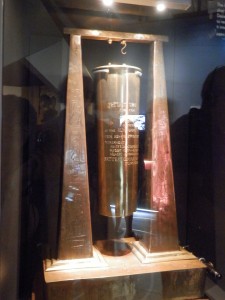
the last shell the Australian gunners fired at Anzac before evacuating, then converted into a mess room dinner gong
If you get a chance, go and see it. It will give you more of an understanding on what our ancestors went through.
www.spiritofanzac.gov.au
World War One: “Out With the German Names”
There’s no doubt that almost every Australian family was affected by World War One in some way or another.
One sad fact that came out of World War One, was the intense hatred of Germans that emerged, together with all things German. The German families who emigrated to Australia and were happily living their lives, being a part of so many local communities. However when war broke out they were suddenly classed as an “enemy alien” purely because of their heritage, with many sent to concentration camps. Yes, even in South Australia.
South Australia had a substantial German population, so much so that many towns and other geographical localities had German names. However, come the start of World War One … and all things German was “the enemy”, so to have German place names was no longer acceptable. To rectify this a Bill was passed to change the name of numerous German named towns and localities towns in South Australia.
To make life easier for all I have compiled a listing of the places that were affected, together with their new name.
| German Place Names in South Australia | |
| Original name | Substitute name |
| Bartsch’s Creek | Yedlakoo Creek |
| Hundred of Basedow | Hundred of French |
| Cape Bauer | Cape Wondoma |
| Berlin Rock | Panpandie Hock |
| Bethanien | Bethany |
| Bismarck | Weeroopa |
| Blumberg | Birdwood |
| Blumenthal | Lakkari |
| Buchfelde | Loos |
| Carlsruhe (or Karlsruhe) | Kunden |
| Ehrenbreistein | Mount Yerila |
| Ferdinand Creek | Ernaballa Creek |
| Mount Ferdinand | Mount Warrabillinna |
| Friedrichstadt | Tangari |
| Friedrichswalde | Tarnma |
| Gebhardt’s Hills | Polygon Ridge |
| German Creek | Benara Creek |
| German Pass | Tappa Pass |
| Germantown Hill | Vimy Ridge |
| Gnadenfrei | Marananga |
| Gottlieb’s Well | Parnggi Well |
| Grunberg (or Gruenberg) | Karalta |
| Grunthal | Verdun |
| Hahndorf | Ambleside |
| Hasse’s Mound | Larelar Mound |
| Heidelberg | Kobandilla |
| Hergott Springs | Marree |
| Hermann’s Landing | Moramora (& later Nildotti) |
| Hildesheim | Punthari |
| Hoffnungsthal | Karawirra |
| Hundred of Homburg | Hundred of Haig |
| Jaenschtown | Kerkanya |
| Kaiserstuhl | Mount Kitchener |
| Klaebes | Kilto |
| Klemzig | Gaza |
| Krause Rock | Marti Rock |
| Hundred of Krichauff | Hundred of Beatty |
| Krichauff | Beatty |
| Kronsdorf | Kabminye |
| Langdorf | Kaldukee |
| Langmeil | Bilyara |
| Lobethal | Tweedvale |
| Mount Meyer | Mount Kauto |
| Muller Hill | Yandina Hill |
| Neudorf | Mamburdi |
| Neukirch | Dimchurch |
| New Hamburg | Willyaroo |
| New Mecklenburg | Gomersal |
| Oliventhal | Olivedale |
| Hundred of Paech | Hundred of Cannawigra |
| Petersburg | Peterborough |
| Hundred of Pflaum | Hundred of Geegeela |
| Rhine Flat Landing | Wongulla |
| Rhine Hill | Mons |
| Rhine Park | Parklo (& later Kongolia) |
| Rhine River North | The Somme |
| Rhine River South | The Marne |
| Rhine Villa | Cambrai |
| Hundred of Rhine North | Hundred of Jellicoe |
| Hundred of Rhine South | Hundred of Jutland |
| Rosenthal | Rosedale |
| Hundred of Scherk | Hundred of Sturdee |
| Schoenthal | Boongala |
| Hundred of Schomburgk | Hundred of Maude |
| Seppelts | Dorrien |
| Schreiberhau | Warre |
| Siegersdorf | Bultawilta |
| Steinfeld | Stonefield |
| Summerfeldt | Summerfield |
| Vogelsang’s Corner | Teerkoore |
| Hundred of Von Doussa | Hundred of Allenby |
| Wusser Knob (or Wusser Nob) | Karun Knob |
Some of these places have since reverted back to their original German name, while others didn’t.
Trove has many articles that relate to the changing (or not changing, or changing back) of the German place names. Here’s links to just found of them I found interesting:
http://nla.gov.au/nla.news-article53438060
http://nla.gov.au/nla.news-article46843946
http://nla.gov.au/nla.news-article60609846
http://nla.gov.au/nla.news-article60331944

